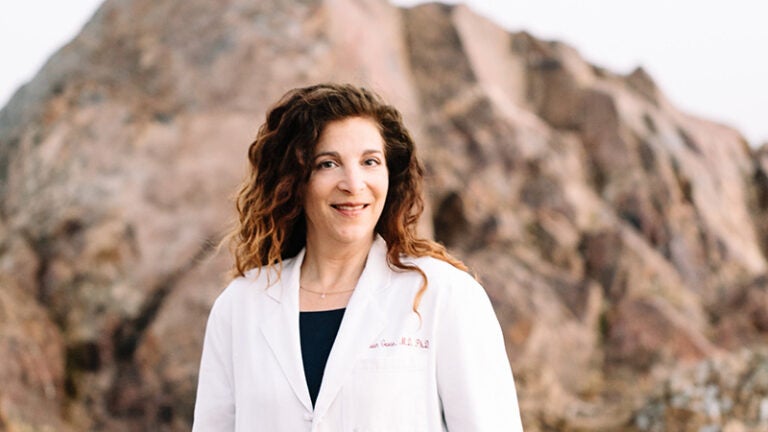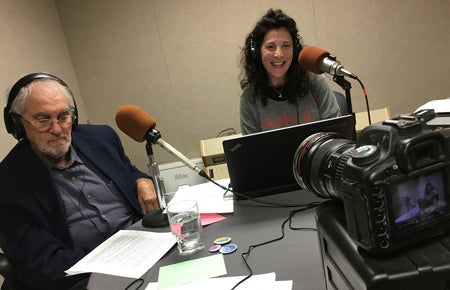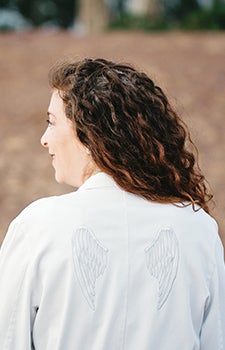
Dying to Talk
The 14-year-old high school boy picked the wild card. “When I die, I’d love nothing more than to be flying a model airplane, then keel over,” he confided. “That would be perfect.”
“Do you hear what he’s saying?” Dawn Gross asked the class. “This isn’t about dying. It’s actually about what he loves doing most in life.”
Gross was teaching the teenager and his classmates to play Go Wish, a game designed to facilitate conversations around death by encouraging players to identify what would be most important to them if they had a limited time to live. It’s a game Gross finds immensely helpful when talking to the terminally ill patients she cares for as a San Francisco hospice and palliative care physician.
Players are asked to prioritize 36 cards, 35 of which describe things people often say are very important to them when they’re dying. The 36th is a wild card. Gross says adults she plays with mostly don’t know what to do with that and set it aside. Children, however, instinctively know what it is and how to use it.
Before attending Gross’ death education course, none of the teen’s classmates knew about his passion for flying model aircraft.
“What a gift that he suddenly had this sense of permission to share something so intimate, while at the same time so integral,” Gross said. “This is what’s so potent, what’s so powerful and possible when we have these conversations.”
Gross knows how to talk about death in a way that replaces fear and dread with honesty, hope and meaning. In addition to her role as a palliative care physician, she’s also the host of Dying to Talk, a radio show that aims to revolutionize how we discuss what to many is still the last great taboo.
“Our mortality is a gift that allows us to fully experience life, that makes us live more deeply, more profoundly.”“People are averse to talking about death, but I’ve noticed that once you give them permission to do so, they really are dying to talk,” she said with a seriousness that belies the underlying warmth and delightful sense of humor that bubbles beneath her words, often rising to the surface at unexpected moments. “It’s exciting to try and make this conversation accessible to people in an unintimidating format that can also provide anonymity.”
Now she’s taking her expertise on this difficult subject into the classroom. “It’s like sex ed, but about death,” chuckled Gross, who has experience teaching both.
Light-bulb moment
The death ed course, which Gross co-created with Jessica Zitter, a Bay Area critical and palliative care physician, has been tested in several Northern California schools. It is voluntary, but has been welcomed with open arms by students, teachers and parents alike.
“It was this light-bulb moment for everyone,” Gross said of the reaction when she suggested it. “How could we not be doing this? Children are not immune to death and aren’t spared the grief. They just haven’t necessarily been given the permission or the tools to talk about it.”
The classes may seem to be all about dying, but, Gross stresses, they’re actually a wonderful opportunity to focus on what makes life worth living right now.
“We actually don’t want you to wait until you’re on your death bed to figure that out,” she said. “We want you to live your whole life that way.”
Gross talks about finding hope and beauty in death, noting that death is a way of embracing life. Being able to face our mortality and talk about death is the secret to finding our own very personal, intimate, deep meaning in life, she argues.
Teaching this to children is particularly valuable, Gross says, because the younger we are, the more capable we are of using our mortality to create a template for how to live our lives when well.
“One wild and precious life”
Instead of saying, “Oh, it’s another Tuesday,” think “Oh my God, I just got another Tuesday, what am I going to do with it?” Gross suggests. She quotes a favorite line from poet Mary Oliver: “Tell me, what is it you plan to do / with your one wild and precious life?”
“Our mortality is a gift that allows us to fully experience life, that makes us live more deeply, more profoundly,” Gross said. “I’ve asked hundreds of terminally ill patients, ‘If I had a magic wand, what would you wish for?’ And not one of them has ever answered, ‘Cure me,’ which is staggering to me.”
Instead, patients respond by asking for something that brings them closer to who they truly are, she said, whether it’s being with family or spending time in their gardens.
“People at the end of life have no problem answering that question, whereas for most of us, it’s very difficult to answer.”
Gross, who earned her bachelor’s in psychology and neuroscience from USC Dornsife in 1989, has years of experience supporting patients with life-threatening illnesses.
Her first job, she said, is to listen.
“People have a hard time articulating or even knowing what is most important to them when they’re struggling with uncontrolled symptoms, whether it’s nausea, difficulty breathing or pain,” she said.
Once those symptoms are brought under control, she helps patients plan their goals of care and helps them identify and realize what they really want to do with the time left to them.
Immense gratitude
Gross said she’s profoundly grateful for the opportunity to practice her chosen specialty.
“It’s not depressing,” she said. “It is sad, and I think to untangle the two is important for people to do. But what we do — being with people and supporting them in the things that matter most in their lives — is a gift. I fall in love with people immediately, so when they die, am I sad that they die? You’d better believe it. But what I’m left with is immense gratitude for having gotten to know them and be part of their lives, and hopefully for helping to make their lives the way they wanted.”
Her major inspiration was her father, who had always been clear he wouldn’t seek aggressive, curative therapies to prolong his life. When he became terminally ill, he questioned traditional care options, asking, “Why is no one asking me what I want?” Gross recalled.
Although he was eventually able to die in his own home under hospice care, Gross said he taught her to want to ask those questions and to help the rest of the family try to listen to what he needed.
“Watching how my family learned to accompany him on his journey was eye-opening and made me more curious about how to support patients and families at such times.”

Dawn Gross interviewing her first mentor, Jeffrey Mandel, during the launch of her radio show, “Dying to Talk.” Photo courtesy of Dawn Gross.
Carin van Zyl, section head of palliative medicine at Keck School of Medicine of USC and director of Los Angeles County+USC Medical Center Adult and Pediatric Palliative Care, identifies what makes her former colleague so inspirational. Gross was her boss when the two worked at City of Hope in Duarte, Calif., and van Zyl describes Gross as “a polestar.”
“Dawn finds a way of communicating real joy when meeting and connecting with people and listening to their stories,” van Zyl said. “She’s eager to help in a way that doesn’t feel too somber, nor inappropriately light, and she’s really good at being genuinely hopeful in a way that isn’t trite. Whatever that ineffable quality about her is, it’s contagious.
“She uses the language of gratitude a lot, which isn’t rare in the field, but Dawn truly is grateful every day that this is where she ended up.”
A fairy godmother
Born in Northern California, Gross spent her adolescence in Portland, Ore. At age 16, already a high school senior, she joined her brother at USC as a resident honors scholar.
She was intrigued by science but hated the sight of blood. However, after taking “Introduction to Neuroscience: Man, Mind and Machine,” taught by now Professor Emeritus of Biological Sciences William McClure, she was hooked.
Admitted into the psychology honors program, Gross focused on neuroscience research, helping map the circuitry of memory. She did a post baccalaureate pre-med program at Mills College in Oakland, Calif., and an M.D., Ph.D. at Tufts University in Boston.
“I wanted to be a scientist,” she said, “but medicine snuck up on me. It wasn’t until I was in a fellowship at Stanford University, training in hematology and bone marrow transplants, that I realized I loved being a physician because I loved having end-of-life conversations. That was something completely unexpected, and it shaped my decision to go into hospice and palliative care.”
End-of-life conversations are something that many doctors — trained to heal, not discuss death — find difficult. Why does Gross cherish the experience?
“In my USC admission essay, I talked about wanting to major in psychology and inspire people to reach their highest dreams and then reach higher still,” she recalls. “Now, that’s all I do every day. I see myself as a fairy godmother. When you’re facing your own mortality, what becomes essential rises to the top and everything else melts away. It’s an extraordinary conversation to get to be a part of.”
Read more stories from USC Dornsife Magazine’s Fall 2017-Winter 2018 issue >>
